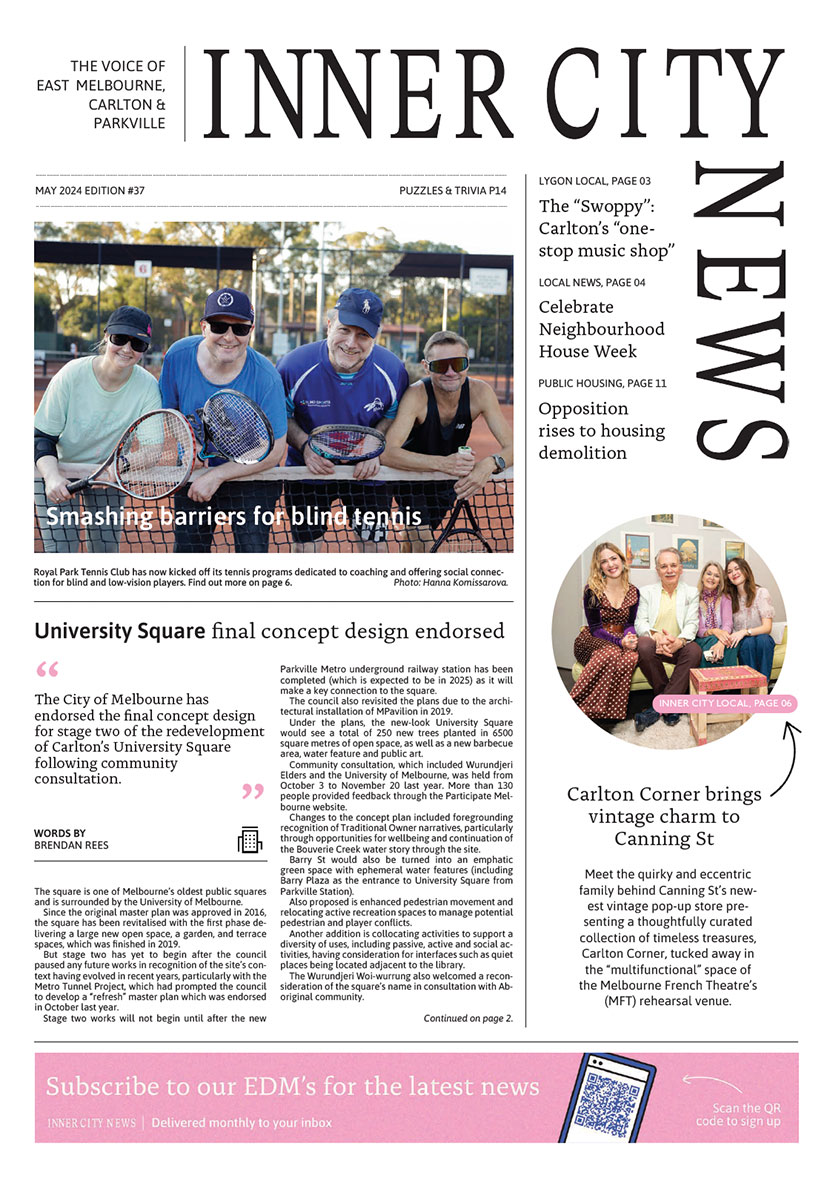Ending homelessness in our city
Homelessness Week has been on our calendars for many years now. It runs from August 1 to 7 this year and you will probably be in that week when you are reading my column.
The homelessness crisis has continued in Melbourne and throughout Victoria – we are not solving it. There was temporary accommodation during last year’s long lockdown but most people did not transition to permanent, safe housing.
The latest monthly data on Specialist Homelessness Services in Victoria in March 2021, advises a slight decrease in utilisation of services since before COVID-19 struck: aihw.gov.au/reports/homelessness-services/specialist-homelessness-services-monthly-data/contents/monthly-data
Services responded to 32,902 requests for assistance in March 2021; 20,645 were female; 12,257 were male; and 3855 requests came from First Nations people. Not all those who were homeless have been counted in these figures. The numbers represent only those who came forward for help.
Requests for assistance in Victoria were 35 per cent of all those seeking assistance in Australia but we only have 25 per cent of the nation’s population.
More than 3800 First Nations people requests were 12 per cent of the all Victorian requests but they make up 0.8 per cent of the total Victorian population, indicating their level of homelessness is 15 times more than the total population’s.
The state government has to provide a formal response to the parliamentary Inquiry into Homelessness by September this year: parliament.vic.gov.au/lsic-lc/inquiries/inquiry/976 and there needs to be maximum pressure on them to commit to ending it and finding the ways to fund ending it.
To end homelessness, governments in all three levels must commit to providing permanent housing for all those who need it.
The state government allocated $5.3 billion last year that I think should have public housing at its centre, as the Save Public Housing Collective is campaigning for.
The federal government has the resources to raise social security payments to living incomes for all. The marginal increase in JobSeeker, post COVID-19 payments, can only be seen as an abandonment of hundreds of thousands to abject poverty and more homelessness.
The federal government should also provide grants to build public housing to all states and territories with no obligations to repay. We know this won’t happen without a change of federal government so next year’s federal election will be our opportunity to vote for this to happen.
In my July Column I drew your attention to Emeritus Professor at RMIT Dr David Hayward’s opinion piece on the intrinsic value of public housing: smh.com.au/business/the-economy/private-landlords-are-losing-billions-should-we-keep-picking-up-the-tab-20210615-p58154.html
This was not just an opinion: it is a factual account of the billions of dollars of federal government funds that have been spent on enhancing the wealth of private investors that has only made housing more unaffordable for millions of households.
At some point in time – and I am suggesting that is now – a majority of voters need to move to demanding a moral position in government policy formation and vote to end this extraordinary financial reward to those who have money to invest and make profits.
I welcome the City of Melbourne’s commitment to ending homelessness
I congratulate my city on its recent decision to transform one of its unused building at 602 Bourke St into a centre for supporting those who are homeless: participate.melbourne.vic.gov.au/make-room/project-overview
But we need the delivery of permanent housing to make this project truly effective in ending homelessness.
I am calling on the City of Melbourne and the state government to review all of their land assets to identify where public housing can be built.
They should also agree on mandatory Inclusionary Zoning on all new developments – both residential and non-residential – whereby developers make direct contributions of land and/or financial contributions to public housing construction. This isn’t a new or radical idea. The state government’s planning laws say it can happen, but they need to step up and mandate that it will.
There could also be an audit of privately owned empty buildings in the city that could be refurbished as public housing.
More welcome news from the City of Melbourne!
The council’s Future Melbourne Committee met on July 20 and a motion moved by Cr Rohan Leppert and seconded by Deputy Lord Mayor Nicholas Reece was passed that condemned the public housing towers lockdowns last year and also demanded an apology from the government to the residents.
Public housing tenants demand a say over what happens on their estates
The state of Melbourne’s towers is a disgrace with lifts not working and a multitude of other problems that should be fixed with the $300 million allocated in the Big Housing Build.
Tenants from Carlton recently approached Minister Richard Wynne for assistance and he has agreed to meet •

Verdict reserved in class action over demolition of public housing towers



 Download the Latest Edition
Download the Latest Edition